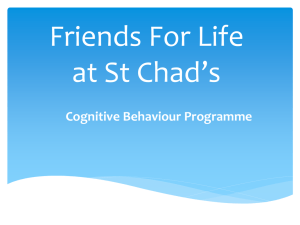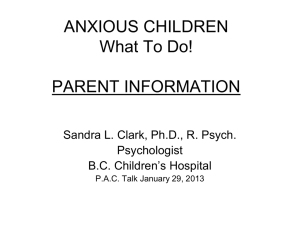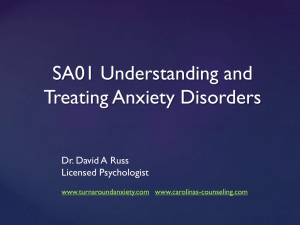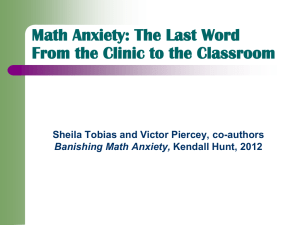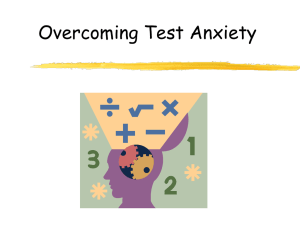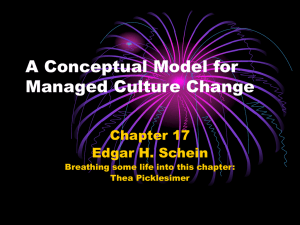here - National Council for Special Education
advertisement
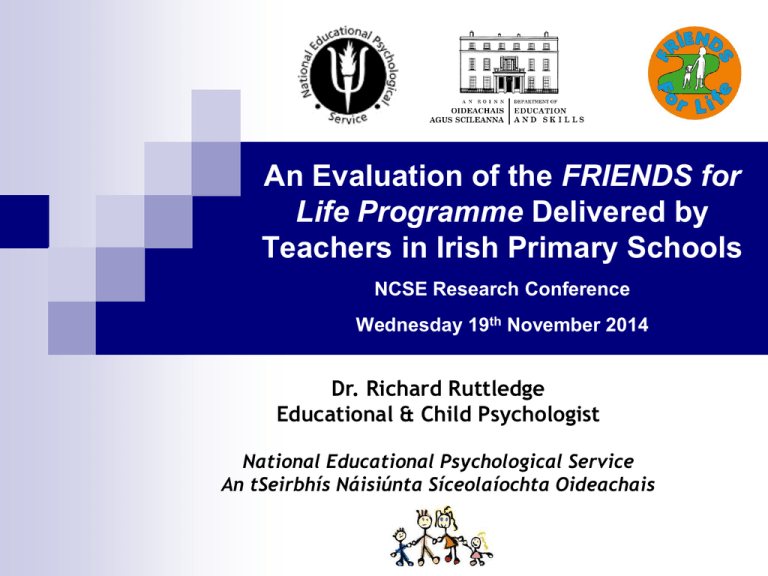
An Evaluation of the FRIENDS for Life Programme Delivered by Teachers in Irish Primary Schools NCSE Research Conference Wednesday 19th November 2014 Dr. Richard Ruttledge Educational & Child Psychologist National Educational Psychological Service An tSeirbhís Náisiúnta Síceolaíochta Oideachais Members of Research Team Dr. Richard Ruttledge (Psychologist, Monaghan) Eileen Devitt (Psychologist, Kerry) Gabrielle Greene (Regional Director, Limerick) Mary Mullany (Senior Psychologist, Navan) Elizabeth Charles (Senior Psychologist, Kilkenny) Joanne Frehill (Psychologist, Dublin) Maura Moriarty (Research Assistant, Ennis) Afric McArdle (Research Assistant, Ennis) Anxiety in Children & Young People Anxiety disorders are one of the most common forms of psychological distress in childhood and youth (Cartwright-Hatton et al., 2004) Prevalence of anxiety disorders in children and adolescents has been reported to be as high as 21% (Kashani & Orvaschel, 1990) with most studies estimating around 10% (Carr, 2006) Can have negative consequences on educational attainment and social functioning (Pine, 1997) Childhood anxiety problems significantly increase the risk of developing mental health difficulties in adulthood (Mattison, 1992) Resilience in Children & Young People Capacity of a person to prevent, minimise or overcome the damaging effects of adversity (Grotberg, 1997) Characteristics associated with being a resilient person: - Using effective coping strategies (Werner & Smith, 1992) - Effectively controlling negative feelings (Eisenberg et al. 2004) - Nurturing a sense of self-efficacy or mastery (Cowen et al., 1997) - Using available social supports (Jonzon & Lindblad, 2005) Belonging in School The need to belong is central to the acquisition of knowledge (Maslow, 1962) Having a sense of belonging to a school community is likely to have a positive effect on learning, mental health and happiness Not belonging may lead to disaffection disengagement from learning, anxiety and depression (Frederickson & Baxter, 2009) Schools where pupils report more feelings of connectedness to adults in peers were strongly associated with higher-pupil ratings of resilience (Stewart et al, 2004) Access to Early Intervention Interventions using cognitive-behavioural approaches are recommended for anxiety (NICE, 2008) Frequently, childhood anxiety is overlooked as these children are likely to be shy, cooperative and compliant (Essau et al., 2012) Children from disadvantaged communities are less likely to receive intervention and more likely to discontinue attendance prematurely (Misfud & Rapee, 2005) Need to consider how evidence-based interventions can be made accessible to children and adolescents presenting with anxiety symptoms Nobel Laureate Economist Dr. James Heckman (2000) has posited that early intervention for children and young people is optimum as later intervention in adulthood is economically inefficient Role of Schools Growing recognition of the important contribution schools can make to the psychological and emotional health of children (Stallard, 2010) Meta-analysis by Durlak et al. (2011) found that school-based, universal social and emotional learning programmes significantly improved social functioning, behaviour and academic performance Vision for Change (DoH&C, 2006) recommends that positive mental health is promoted across the community Social, Personal & Health Education (SPHE) curriculum provides opportunities for children to improve their ability to cope with problems and emotions, and to develop their interpersonal skills (Buckley, Gavin & McNicholas, 2009) Reach Out National Suicide Prevention Strategy (2005-2014) recommends that promotion of positive mental health should form an important part of the school curriculum Better Outcomes, Brighter Futures – National Policy Framework for Children and Young People (DCYA, 2014) highlights the importance of prevention and early intervention to develop emotional resiliency, selfregulation, empathy and self-esteem The FRIENDS Programmes Developed for children aged 4 years right through to adults. Each programme is similar in theoretical principles. However, each programme is age appropriate and has additional techniques for each stage of development Fun Friends (4 to 7 years) Friends for Life (8 to 11 years) My Friends Youth (12 to 16 years) Resilience for Life (16+) FRIENDS for Life The programme, developed and licenced by Pathways Australia, is a cognitive-behavioural early intervention and prevention programme for childhood anxiety, which can be delivered universally to children and adolescents (Barrett, 2004) Very positive evaluations internationally Endorsed by the World Health Organisation & listed on US National Registry of Evidence-Based Programs and Practices (2013) NCSE report by Cooper & Jacobs (2011) stated that the “programme has been shown to be effective in improving the emotional coping skills of children and young people…combines the best qualities of a therapeutic programme with a general life skills intervention that can be incorporated into the regular curriculum for all students” (p.106) FRIENDS for Life Helps children to cope with feelings of fear, worry and sadness by building emotional resilience and self-esteem Teaches children cognitive, behavioural and emotional skills in a simple, well structured format Promotes self-expression, problem solving and the building of positive relationships with peers and adults fits well with normal SPHE curriculum Aims to reduce the incidence of psychological disorders, emotional distress and impairment in social functioning Founded on two teaching philosophies: the Peer Learning Model and Experiential Learning Involves 10 sessions with children and 2 psychoeducational sessions for parents Uses a variety of approaches: group work, role plays, written exercises, games, and interactive activities FRIENDS for Life The word ‘FRIENDS’ is an acronym that helps children remember coping steps, as follows: F - Feelings R - Remember to Relax. Have quiet time I - I can do it! I can try my best! E - Explore Solutions and Coping Step Plans N - Now reward yourself! You’ve done your best! D - Don’t forget to practice S - Smile! Stay calm and talk to your support networks! Why should NEPS Psychologists train teachers to deliver FRIENDS for Life? Teachers have a unique perspective on understanding the particular school context (Shute, 2012) Teachers are more effective than outsiders at providing social-emotional education in schools (Durlak et al., 2011) “Educational Psychologists are the (mental health) professionals most thoroughly embedded in the educational system” (MacKay, 2006, p.16) NEPS consultative model of service provides an appropriate framework to support teachers in implementing the FRIENDS for Life programme Neil & Christenson (2009) suggested that further research is needed to establish what levels of training, support and supervision are needed to increase teacher confidence in delivering of social and emotional learning programmes Objective of the Study Further develop the evidence base for teacher delivery of the FRIENDS for Life programme as part of the SPHE curriculum, after receiving training from Pathways accredited Psychologists from NEPS Study Design & Methodology 27 Primary Schools (709 Pupils) 13 Schools in Intervention Group (333 Pupils) January – April 2013 Receive FRIENDS for Life Programme Mean age: 10.83 years Mostly 5th Class Some 4th & 6th Class where Multi-Grade Setting 14 Schools in Control Group (376 Pupils) January – April 2013 SPHE Curriculum as Normal April - June 2013 Receive FRIENDS for Life Programme Data Collection Time 1 January 2013 Time 2 April 2013 Time 3 June 2013 Study Design & Methodology Parents/Guardians, teachers and children completed questionnaires a number of times in order to evaluate the effectiveness of the programme Teachers attended two days training delivered by NEPS psychologists leading to certification as FRIENDS for Life Group Facilitators (November 2012 or March 2013) NEPS psychologists co-facilitated two parent workshops with school staff. (One at the beginning and one in the middle of the programme) NEPS psychologists were available to teachers throughout the study when needed Results Anxiety Measure: Spence Children’s Anxiety Scales (Child & Parent Version) Females reported significantly higher levels of Total Anxiety than males At Time 1 17% (n = 106) rated themselves in the elevated range on the Total Anxiety Scale; At Time 3 6% (n = 39) rated themselves in the elevated range Hypothesis that the intervention group would have lower levels of Total Anxiety at Time 2 than the control group was supported by ratings on SCAS-Parent (p = .04); however, despite reductions, scores on the SCAS-Child did not reach statistical significance (p = .06) Reductions in Total Anxiety were maintained and continued to drop at 3 month follow-up for intervention group Significant effect found on Total Anxiety for children attending designated disadvantaged schools (DEIS) (p = .02) and EBD Special Schools (p = .04) Significant reductions in child ratings of social phobia (p = .01) and physical injury fears (p = .00) Significant reductions in parent ratings for separation anxiety (p = .00) and social phobia (p = .00) Analysis of Written Concerns from the Spence Childhood Anxiety Scale Common concerns: SCAS-C Self Animals & Physical injury Social Societal Family Friendships/ Social Inadequacy Criminal activity Familial Loss Results Anxiety Decrease in anxiety symptoms was supported by the reduction over time in the number of children answering the open-ended question on the SCAS-Child “Is there anything else you are afraid of?” In contrast to international research, where fears of physical danger is thought to decrease with age (Westenberg et al., 2004) it was found that “fear of physical injury” was a highly rated concern for participants Stallard (2002) posits that given the skills based nature of cognitive behavioural based interventions, substantial practice and reinforcement is required to ensure maximum effectiveness Children need time to practice the skills learned, therefore the current study may not have captured the true impact of the programme (e.g. with long-term follow-up at 12-24 months) In Summary: Evidence to accept Hypothesis Results Self-Concept Measure: Beck Self-Concept Inventory for Youth & Social Validity Measure Self-Concept is an important resilience factor influencing children’s ability to cope with life challenges (Liddle & Macmillan, 2010) The intervention group reported significantly greater improvements in self-concept than the control group (p = .00) Gains were maintained, and continued to improve, at three month follow-up Previous research has also reported improvements and maintenance, at long-term follow-up, of self-concept gains following participation in the FRIENDS for Life programme (Stallard et al., 2008; Liddle & Macmillan, 2010; Crosbie et al., 2011) Data from the SVM indicated that children reported they “feel good”, parents reported that their children appeared “more confident”, and teachers noted that the programme “opened up self-esteem within the children” Results Self-Concept Measure: Beck Self-Concept Inventory for Youth Results Coping Measure: Coping Efficacy Scale & Social Validity Measure People with higher levels of coping self-efficacy beliefs tend to approach challenging situations in an active and persistent way, whereas those with lower levels tend to direct greater energy to managing increasing emotional distress (Bandura, 1997) Significant reductions on the Coping Efficacy Scale (p = .00) indicating that the intervention group had improved capacity to cope with stress and challenging situations Gains were maintained at three month follow-up Participants reported that they learned skills about coping when feeling worried e.g. Coping Step Plans Participants reported on current situations where they were using the skills learned in the programme to cope better with anger management, friendships and sports Results School Connectedness Measure: School Connectedness Scale & Social Validity Measure The intervention group’s sense of happiness, belonging, safety and closeness to others in school was significantly higher than the control group at Time 2 (p = .00) Gains were maintained at three month follow-up Children reported “liking school better” and their teachers noted a more “positive outlook” in school and that the “FRIENDS for Life language is used naturally throughout the day” Parents described how the skills learned during the programme led to an improved sense of family connectedness Home activities are a core part of the programme to help consolidate new skills and to share experiences. In addition, psycho-educational sessions for parents serve to reinforce the importance of family connectedness and secure attachments Results Teacher Implementation of the FRIENDS for Life programme Measure: Social Validity Measure Hypothesis that teachers are effective programme leaders was supported by quantitative data showing positive outcomes for children Qualitative data from children and parents was overwhelmingly positive in attesting to teacher’s capacity to deliver the programme Value of having teacher-led social and emotional interventions has been advocated in the literature as being equally (Barrett & Turner, 2001) or indeed more effective than outside professionals (Durlak et al., 2011) In the current study the teachers were delivering the FRIENDS for Life programme for the first time. Therefore, it could be hypothesised that the impact of the programme on participants would be greater as teachers become more practiced at delivering it Through universal delivery by teachers the programme is nonstigmatising and therefore more acceptable to parents as opposed to being targeted at specific groups of children (Rait et al., 2010) Pupil voice… “Before the FRIENDS programme I felt sad, dull, guilty and I was really worried. I liked all of the activities and I had fun with my friends. Now I feel good about myself” “It’s helpful and helps you cope with stress” “I thought it was great, fun and a great way to conquer your fears.” “I would like to do this FFL programme again because the things I learnt were terrific. I loved FFL it made me feel really happy. I always had a lovely comment going home about FFL. I loved doing the family activities and games”. Teacher voice… “It provides excellent coping strategies for dealing with difficult situations” “I think those in my class who are ‘worriers’ benefitted a lot from the course. All children enjoyed it and learnt something useful from it” “I found the FRIENDS programme very useful and worthwhile. The pupils in my class benefitted greatly and were very open to giving their opinions and feelings when they were finished. I believe it was particularly helped the girls that were timid, reserved and shy before the beginning of the programme. I feel they interact more with the class now and in class discussions” . Parent voice… “He is no longer scared of being alone in the house and can sleep in his room by himself” “A brilliant programme and needs to be brought into schools for all classes, I feel that this programme is as important, if not more important than any other subjects taught” “Each day we discuss the day at mealtime as a family unit. Myself as a parent I also benefit from changing negative to positive thoughts” Study Limitations Skills based and cognitive-behavioural nature of the FRIENDS for Life programme indicates that longer-term outcomes are particularly important for assessing the true effect of the intervention In the present study there was less time for changes to take effect and impact on daily life; the reported results may therefore underestimate the true impact of the programme (In-Albon & Schneider, 2007) International research has found larger effects for the programme when children are followed up at 6 and 12 months (Essau et al., 2012) Anecdotal evidence suggests that teachers stuck rigidly to the children’s workbook, which was not always culturally or age appropriate In addition, teachers were confined to a very tight timeline within which to deliver the programme It is likely that teachers would be more effective at delivering the programme after repeated delivery, as they would become more familiar with programme content and structure Future Directions Durlak et al. (2011) found that that social and emotional learning programmes yielded an average gain on achievement test scores of 11 percentile points An area of future investigation would be to ascertain if children’s attainment scores rose after completing the FRIENDS for Life programme Further longitudinal research could assess programme impact over a longer period of time and allow examination of associated helpful effects in relation to the issue of transition from primary to post-primary school Future Directions Jennings and Greenberg (2009) highlight the importance of teachers’ social and emotional competence and well-being in the development of supportive teacher-pupil relationships, effective classroom management, and successful social and emotional learning programme implementation Future research could consider the effect of completing the Adult Resilience programme on teacher delivery of the FRIENDS for Life programme with children Given that the programme was developed in Australia, some of the activities were culturally unsuitable and need to be modified to suit an Irish context Study Implications Teachers are in a unique position to intervene early with preventive social and emotional learning programmes Through providing such resilience building programmes universally and using real life examples where anxieties can be acknowledged and explored, these interventions can help to normalise feelings of worry and can reduce the stigma that is related with such difficulties Current study complements previous research which has shown that the FRIENDS for Life programme can be successfully delivered by staff who are not mental health professionals such as teachers and school nurses (Barret & Turner, 2001; Stallard et al., 2007) Study Implications Effective delivery is predicated by a number of factors including leader commitment and confidence in talking about issues relating to mental health (Stallard, 2010) Ongoing support and consultation to support the implementation of the programme in schools is an important aspect of the intervention protocol, to ensure the syllabus is delivered with fidelity Psychologists from the National Educational Psychological Service (NEPS) are in a unique position to offer such support and they have the requisite skills to support the implementation of programmes like FRIENDS for Life in schools (Fagan & Wise, 2007) Finally, a word of thanks to all of the children, parents, teachers and schools who participated in the study


